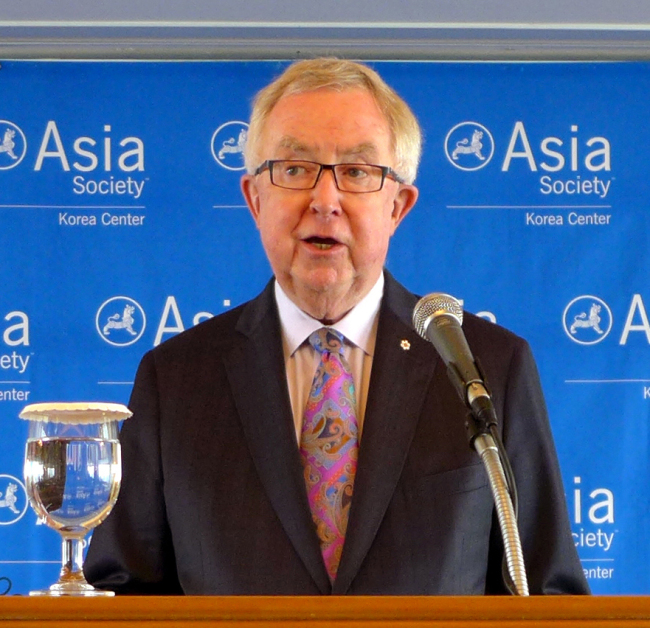Former Canadian Prime Minister Joe Clark urged Canada and Korea to bolster diplomacy in a world characterized by withering superpowers and sprouting middle powers.
Canada’s 16th Prime Minister from 1979 to 1980 told a group of diplomats and scholars that as the international order is reconfigured around the world, nations increasingly rely on soft-power strategies of compromise, negotiation and development, rather than hard-power tactics of military aggression and verbal intimidation.
Middle-power actors, such as Canada, Korea, Turkey, Indonesia, Malaysia and Australia, matter progressively more, as they have more flexibility in opening new dialogues and reaching across national boundaries.
Canada’s 16th Prime Minister from 1979 to 1980 told a group of diplomats and scholars that as the international order is reconfigured around the world, nations increasingly rely on soft-power strategies of compromise, negotiation and development, rather than hard-power tactics of military aggression and verbal intimidation.
Middle-power actors, such as Canada, Korea, Turkey, Indonesia, Malaysia and Australia, matter progressively more, as they have more flexibility in opening new dialogues and reaching across national boundaries.

“In the superpower age, leadership came from the top. But in a globalized era, ‘leadership from beside’ matters more than from the top,” Clark said in a lecture organized by the Asia Society on May 14.
“Middle-power nations have a shared interest in making the multilateral system work. They have greater need for rules and order, which fosters an international order based on agreement than force.”
Forming alliances for Canada and Korea is “both necessary and second-nature,” claimed Clark, as it allows these peace-abiding, democratic states to fulfill their potentials and have an impact on a changing world.
Unlike powerful states, such as the U.S. and China that are embedded in protective regional security arrangements, middle-power countries can cooperate to exert capacity beyond their borders and punch above their weight, he stressed.
“New kinds of alliances should be considered when traditional power is dispersing, new challenges are emerging and familiar remedies are failing,” he explained. “Our traditional alliances are still valid and valuable. But it is time to contemplate new levels of partnership, which are informal but serious, with outward-reaching nation states.”
Partnerships do not need to be formal or complex, Clark noted, as they can start from an agreement to regularly meet and consult on issues. As bilateral agendas tend to focus on particular and urgent issues, it is important to move beyond two-way ties to consider “unexplored possibilities.”
Clark explained that Canada acquired a middle-power reputation by contributing to postwar international developments.
“Immediately after World War II, Canada was active in building a new international order to replace what had been destroyed,” he said. “We developed concepts such as peacekeeping, contributed to the formation of the World Trade Organization, and actively took part in the United Nations and North Atlantic Treaty Organization.”
Canada also played a major role in modernizing the Commonwealth, taking it from an alliance of former British colonies to an inclusive and collaborative global partnership.
Clark, who last visited Korea in 1988 during the Seoul Summer Olympics as a foreign minister, said Seoul has become greener, cleaner and more visitor-friendly. He came to Korea to participate in the Jeju Forum for Peace and Prosperity.
The former leader of Canada’s Progressive Conservative Party is currently the vice chair of the Global Leadership Foundation -- a nonprofit organization comprised of former heads of state and government, providing governance advice to politicians worldwide.
“Korea is one of the most remarkable middle-power countries. You are a model of how international development can transform a once-devastated country into a vibrant economy and democracy,” Clark highlighted. “Through efficient statecraft, Korea became an OECD country with a latent capacity for innovation.”
In a world increasingly fraught with tensions and conflict between “the West and the rest,” Canada and Korea need each other as natural partners, Clark stressed. He added that both nations share a forward-looking vision, innovative problem-solving capacity, and the desire to seek out new opportunities.
The alliance between Canada and Korea does not need to rely on formal institutions, but should make use of non-state actors -- nongovernmental organizations, socially responsible corporations, environmental groups and public foundations, Clark emphasized.
Echoing an argument in his book, “How We Lead (2013),” Clark said that these organizations have greater freedom, enthusiasm and trust than formal institutions, whose capacities are constrained by existing interests.
“The world of international diplomacy is increasingly busy. Non-state actors have acquired new prominence, capacity and influence in this modern era,” Clark said. “But there is no system that allows them to change the world constructively. There are more meetings, but less discussions and incentives for new thinking.”
Noting that the Asia-Pacific region has always been embroiled in geopolitical tensions, Clark said the critical question for Korea is how to translate its multilateral commitment into tangible stability and prosperity.
By Joel Lee (joel@heraldcorp.com)
-
Articles by Korea Herald








![[Graphic News] More Koreans say they plan long-distance trips this year](http://res.heraldm.com/phpwas/restmb_idxmake.php?idx=644&simg=/content/image/2024/04/17/20240417050828_0.gif&u=)
![[KH Explains] Hyundai's full hybrid edge to pay off amid slow transition to pure EVs](http://res.heraldm.com/phpwas/restmb_idxmake.php?idx=644&simg=/content/image/2024/04/18/20240418050645_0.jpg&u=20240419100350)






![[From the Scene] Monks, Buddhists hail return of remains of Buddhas](http://res.heraldm.com/phpwas/restmb_idxmake.php?idx=652&simg=/content/image/2024/04/19/20240419050617_0.jpg&u=20240419175937)

![[KH Explains] Hyundai's full hybrid edge to pay off amid slow transition to pure EVs](http://res.heraldm.com/phpwas/restmb_idxmake.php?idx=652&simg=/content/image/2024/04/18/20240418050645_0.jpg&u=20240419100350)

![[Today’s K-pop] Illit drops debut single remix](http://res.heraldm.com/phpwas/restmb_idxmake.php?idx=642&simg=/content/image/2024/04/19/20240419050612_0.jpg&u=)